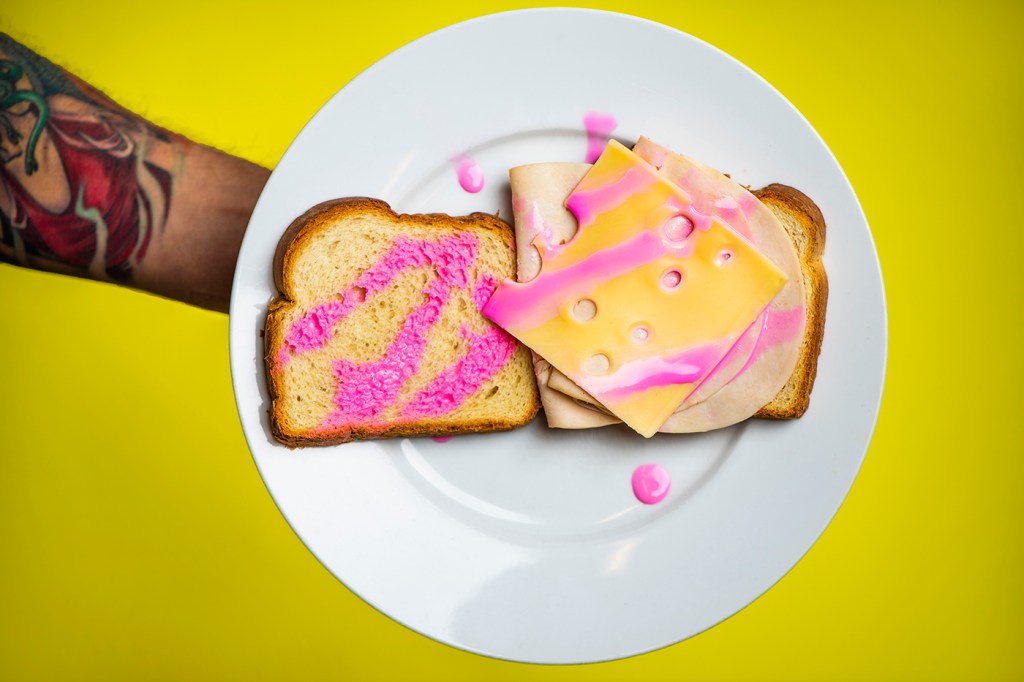Pink Sauce, viral TikTok condiment, leaves bad taste in mouth of Northeastern food safety expert

The once viral now infamous Pink Sauce sold online by a Miami chef has raised lots of food safety red flags for food policy safety expert Darin Detwiler, an associate professor at Northeastern University in Boston.
“Mail ordering food during a trial phase is just an accident waiting to happen,” says Detwiler, who teaches at Northeastern University’s College of Professional Studies.
“You can’t market and ship as if it’s gone successfully through the trial phase. That’s exactly what the owner of this company is doing,” he says.
Pink Sauce, for those who have somehow missed the debut-turned-debacle of the Pepto Bismol-colored condiment, was created by a private chef and mixologist who goes by the name Chef Pii on social media.
Pii demonstrated the condiment on TikTok and Instagram by dunking chicken tenders into a clear bowl of bright pink sauce, and social media users ate it up.
Pii says all 100 bottles available for pre-sale sold out immediately, at $20 a bottle, according to the Los Angeles Times. More sales rolled in with a product launch July 1.
Then came the backlash.
From Tiktok to Youtube to Twitter, social media users started asking why the product—which at one point listed milk as an ingredient—was not being shipped in refrigerated containers and how it was being regulated and by whom.
They also want to know what is up with the labeling, which says there are 444 servings per container.
These are all legitimate questions, questions that are becoming increasingly important for consumers to ask with the rise of direct-to-consumer food products, Detwiler says.
In the past, people counted on their grocery stores and local restaurants to validate food safety and conform to local or county public health inspections, he says.
But foods sold online earn an “instant reputation” as soon as they appear on well-designed websites, Detwiler says.
Allowing a social influencer to sell you a food product “is on the same level of finding a really good deal on some steaks you bought from a guy in the back of his pickup down the highway,” Detwiler says.
The purchase carries a level of risk, as demonstrated by the sickening of people eating Lentil and Leek Crumbles by Daily Harvest, a brand popular on social media.
On July 19, Daily Harvest identified high-protein tara flour as the cause of illnesses affecting hundreds of people, including 30 individuals who had their gallbladders removed, according to eater.com.
There’s a growing concern over foods distributed in other ways than brick-and-mortar establishments, says Detwiler.
The COVID-19 pandemic caused an explosion of direct-to-consumer and cottage industries, he says.
But it’s one thing to have tennis sneakers delivered to your doorstep. It’s another thing to get a food product in the mail, even a condiment, Detwiler says.
“All of a sudden we have companies like Daily Harvest, like Pink Sauce, that have a website and they’re good to go.”
With Pink Sauce, there’s no indication a control method is in place to keep the product from spoiling and allowing the pathogens that cause botulism to grow, Detwiler says.
“Just because it’s the next big thing doesn’t mean it’s ready to be the next big thing,” he says.
Detwiler knows all too well the dangers of food poisoning, having lost his 16-month-old son Riley to E. coli poisoning during a well-publicized outbreak in ground beef.

Riley had never eaten a hamburger, but he got a secondary infection at his daycare center from a child whose mother worked at Jack in the Box.
The death of his son inspired Detwiler to become a national expert and speaker on food safety.
But he says there’s still much room for improvement, with the Centers for Disease Control and Preventing saying 48 million Americans are sickened by food poisoning every year, 128,000 of whom are hospitalized and 3,000 of whom die.
“Most of these (cases) could have been prevented,” Detwiler says. “The sad part of this, what I’ve seen for three decades, is that every time we talk about changes in policy it comes after consumers have already been harmed.”
Detwiler says he’s concerned because Pii is mass marketing Pink Sauce during what she herself has described as a trial phase.
“You don’t go to market when you’re in a trial phase,” Detwiler says.
“It sounds as if they are operating like a cottage food industry but trying to operate at a national scale. You’ve got to go through the steps and regulatory audits in order to be compliant.”
Detwiler says he’s also concerned by a video posting in which Pii indicates her product doesn’t have to be regulated by the U.S. Food and Drug Administration because it’s not a medicine—a posting that has earned her mockery for not acknowledging what the “F” in the agency’s name stands for.
The FDA does regulate foods involved in interstate commerce, Detwiler says. He also says the courts have sent executives of companies whose food products have sickened or killed people to jail.
Questions about whether the FDA regulates sauces is one of the most popular inquiries about the federal agency now, thanks to Pink Sauce. The FDA says on its website that it does indeed regulate dressings and condiments.
Investors love the idea of instant success but they also want to avoid lawsuits, Detwiler says.
He says Pii can’t avoid liability by saying her product is in a trial phase.
“Do they have a food safety plan and has it been validated by the FDA? Do they have a recall plan?” he asks.
“As we continue to have more disruptive elements in the food industry, they will continue to challenge our existing policies and put consumers at risk,” says Detwiler, the author of Food Safety, Past, Present and Predictions.”
In response to the flood of criticism surrounding Pink Sauce, Pii went on Youtube for 52 minutes July 21 to describe product ingredients as well as the taste—“It’s sweet. It’s garlicky. It’s tangy. You can taste the chili inside.”
She told viewers that the product is being prepared in a commercial kitchen and subjected to various stability tests, such as being left out in the sun or open on the counter for a day.
“We are abiding by the FDA standards. We do manufacture the sauce in an FDA-approved facility,” Pii says.
“We are currently in lab testing. Once we go through lab testing, we will be able to pitch to stores to put the Pink Sauce in stores,” she says.
Pii also says the labeling is being corrected, although a quick peek at the website shows it still says the bottle of Pink Sauce has 444 servings.
The FDA takes food labels seriously, and for a good reason, Detwiler says.
“There are a lot of people with a great idea. But you have to go through the proper steps,” he says.
“Trust has to be built by a lot more than the endorsement of a social media influencer.”
For media inquiries, please contact media@northeastern.edu.






